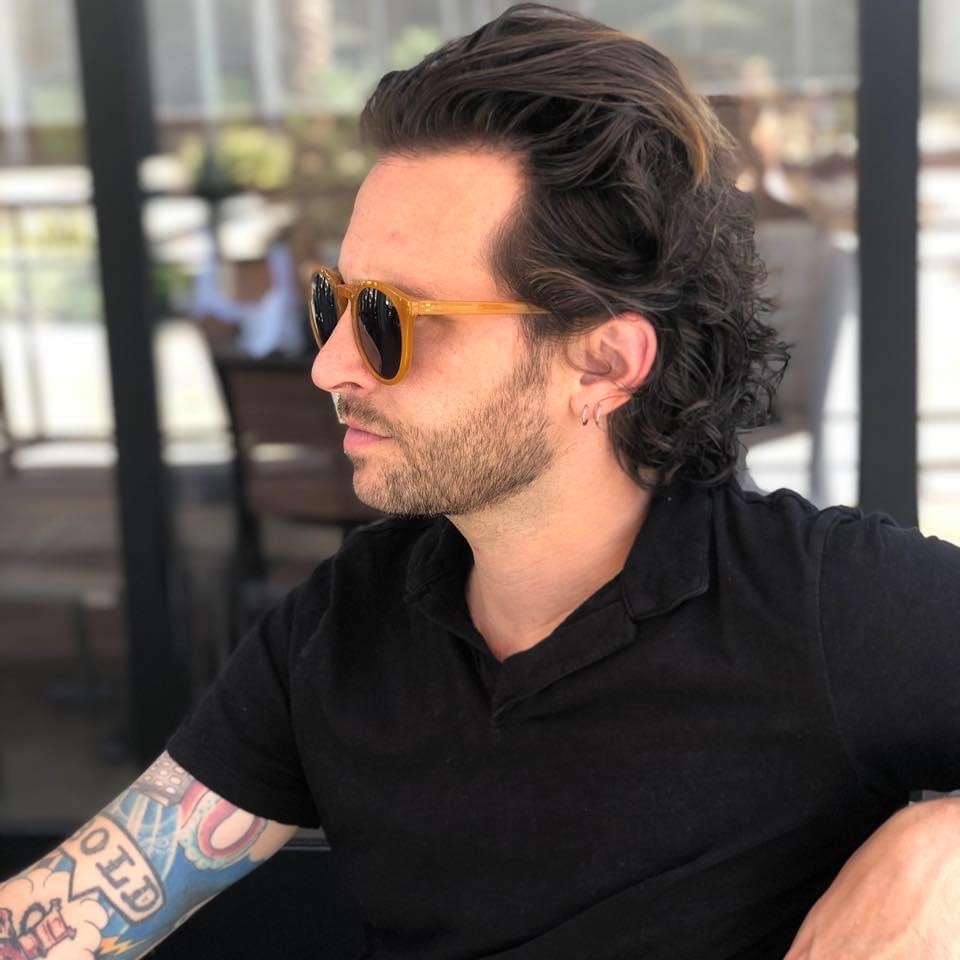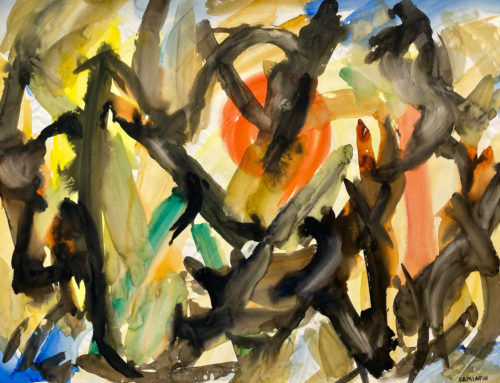“I am not built for the apocalypse,” writer Rob Bowman concedes in his new essay, “What We Sow.” “Narrow shoulders and skinny arms. I spend most of my time reading and writing and teaching reading and writing. My nails never have dirt under them and my palms are very soft, so soft that my wife has teased me about them on more than one occasion.”
But, as his writing reveals, Bowman, faced with the COVID-19 stay-at-home orders that keep him away from teaching at Indio High School, is learning to get his hands dirty. He has created a garden to stay busy and give his energy and outlet.
“The idea of gardening started as a lark at the end of February, a pile of supplies I had stacked up in the garage thinking it was something we should try. Then, in the middle of March, it became an imperative, a way to quiet the shouts about where we would get food. I started to worry.”
He worried not only about own livelihood, but also that of his students.
“How are my students? What are they doing? Do they have enough to eat?”
“One of my students told me that she wouldn’t be attending my Zoom lessons. She needed to get a job right away, she is at a grocery store now, on the front lines, risking illness, because both of her parents lost their jobs.”
Bowman’s essay, which appears below, has earned the writer a $500 grant to “Keep Art Alive” from the California Desert Arts Council (CDAC).
CDAC and affiliate La Quinta Arts Foundation established a $50,000 Keep Art Alive fund to award grants to Coachella Valley artists and arts organizations who create thoughtful, inspiring, and relevant works responding to the crisis.
Bowman has published writing in the Coachella Review and will appear in the upcoming collection Palm Springs Noir.
What We Sow
By Rob Bowman
Time during quarantine is a jagged thing. Its sharp corners and ungainly shapes, between caring for children and frantically checking emails to figure out my job, don’t fit neatly into devoted times to write or even watch movies. Anything that requires the twin pillars of concentration and not listening to children shout is nearly impossible, not to mention the gnawing fear and anger. Without a logical target, the anger just whirls about.
When storms are formed, it is because there are areas of high pressure and areas of low pressure. The high pressure pushes in and on and down so that everything rushes along to the areas of low pressure and that is when the winds howl and careen. The Coachella Valley sits low and flat and the sun cooks the ground. The heat lifts the air and the pressure gets lower and lower around here. The mountains that surround the valley keep the pressure disparity in place for as long as possible but ultimately just accentuate the differences, making it starker and stronger until that wall collapses and the pressure barrels through, bending palm trees, blowing down signs. We are walking storm conditions these days, burbling and grumbling and thunderous.
This is all how I’ve found myself building and planting a garden, behind the shed and along the wall, protected from the winds in a tiny space that seemed useless until now.
For a backyard garden, I felt it was quite big and almost enchantingly beautiful. It lines one wall of my yard and is almost twenty-two feet long and eighteen inches deep, raised up a couple feet more. I wheelbarrowed in dirt from an empty lot and filled it within nine inches of the top and then bought expensive soil to actually plant into. I bought a very small seed nursery and little packets of tiny seeds and lovingly put them in finely ground mulch, watered them and put on the lid and my children and I stared at them, willing them to grow.
The idea of gardening started as a lark at the end of February, a pile of supplies I had stacked up in the garage thinking it was something we should try. Then, in the middle of March, it became an imperative, a way to quiet the shouts about where we would get food. I started to worry. In April it became something else for me, something that it still is now but that I have a hard time admitting to myself. And I need it.
I am not built for the apocalypse. Narrow shoulders and skinny arms. I spend most of my time reading and writing and teaching reading and writing. My nails never have dirt under them, and my palms are very soft, so soft that my wife has teased me about them on more than one occasion. But I managed to build the garden walls and fill them, amazed at how people much tougher than I will ever be work all day in the desert sun in peak summer. It made me think about something I didn’t want to think about, and I tried to compartmentalize my thinking.
How are my students? What are they doing? Do they have enough to eat?
***
My classroom is a hub of noise and joy. During class, of course, but every passing period (and during lunch and before and after school) students come in and wave or shout or both and they often ask if I have anything they can eat. I reach into the drawer behind my desk that I keep stocked for precisely this reason, into the tiny refrigerator that is stuffed with string cheese. It’s all things I can slip quickly to a student and they can slip it into their pockets and then slip away as though they didn’t just have to ask me for this, as though everything is fine, and they aren’t hungry all the time. I have band aids, actual and otherwise.
I only see them every other day due to a block schedule and on March 12th I told my students I would see them next week. That was two months ago. Even on the 13th school wasn’t called until after the final bell. I kept telling kids I would see them soon. If I had known, I would have told them to clean out my drawers, take everything. But at the end of the day, my drawers were still stocked up, as they left the school for who knows how long.
***
My family and I set up the little mulch pods and put in the seeds and waited expectantly for them to grow. We watched them sprout with fascination. We made a little family experience out of planting them. We realized that home schooling our five- and seven-year-olds was nearly impossible while teaching our actual students from home. I made YouTube videos, worksheets, read every email promising a new and amazing way to teach. I worried that these programs were going to replace me, science fiction finally coming true but sending all of the teachers to the breadlines instead of, you know, melting brains and such.
I watched the news and read every article I could find and being informed did not make me feel better. I should have just stopped at “don’t leave your home, dummy.”
This is a gardening essay. Pandemic gardening. I’ll stay on track now.
***
The plants grew quickly, and I had time to garden. I never bothered in the past because I don’t know how to make a watering system but who needs watering systems now? Where am I going? I stand out there and water them in the morning and in the evening. I might be overwatering them. I have no idea how to tell.
I started a project that smells like what I imagine hell is like. There is something petroleum about the scent; it smells like rotting dinosaurs. I asked my wife how something as natural as decomposing fruit and bread could smell like a definition of synthetic. The flies swarmed.
Have you ever seen a potato plant? I hadn’t. The plant part of it above ground is beautiful and tall and a little terrifying. Cantaloupe plants grow little tendrils that wrap around anything nearby and climb. I watch them climb and think that when the fruit comes, it won’t be able to hang on, will come crashing down. I will come outside to snapped vines, fruit carnage, the ceaseless buzzing of clouds of flies. It sends me reeling and questioning.
I dove deep into the tunnels of YouTube to learn about gardening and this produced panic in me. There are so many gardening YouTube channels. There may be videos about gardening made by sweet people who, like my deceased grandmother, could gently tell you about all of the plants, wipe their brows with the back of a somehow clean glove on their hand and then grab some lemonade to drink. Those may exist. But every video I saw was hosted by a man who was usually shouting about gardening. A guy in Los Angeles insists he spent a month eating only things from his garden. I watched all of his videos, worried that this fate was forthcoming, and my food had better start growing quickly. I became briefly dedicated to the videos of an Australian man who seems pretty jolly most of the time but in one video, on pineapples, he became unreasonably angry (for a gardening video, a relative measure) about how some grocers cut the tops from the pineapples they sell to prevent gardeners from replanting the tops. I stopped watching him after that.
I ordered live ladybugs online and received dead ladybugs in the mail.
I ordered 1,000 worms. They came in little bags with a cartoon portrait of someone called Uncle Jim. These worms came with the Uncle Jim stamp of approval. I kept the bags after putting the worms in the garden. Whenever I pull the soil back and see a worm there, I squeal with delight and then apologize to the worm in case I have scared it or hurt it.
I look up worm care on my phone and find out that it is called vermiculture and I think it would make a great name for an art gallery as long as you didn’t tell anyone what it meant. It sounds exciting. I’m on my phone all of the time these days, it seems, looking up answers to questions that I have never even thought to ask before.
The weeks before the world shut down the students in my classroom wanted to talk about nothing but COVID-19, asking me endless questions and I spent at least the first ten minutes of every class, every day talking about it until they ran out of questions. At least an hour of my waking day was spent largely saying I don’t knowand Don’t worry.
Only one of those things was a true statement.
They could have looked on their phones, they are creatures of their phones. Teenagers love to be on their phones and communicating just up until the point where I really need them to do so. I send them emails and ask them how they are doing, and no one responds. I worry and rethink my lesson plans. Am I giving them too much work? Is it pressure they don’t need right now? One of my students told me that she wouldn’t be attending my Zoom lessons. She needed to get a job right away, she is at a grocery store now, on the front lines, risking illness, because both of her parents lost their jobs. Another won’t be attending because he is now working in the fields, harvesting food for people who are just sitting at home. People like me, I mean. While I watch my hobby garden grow.
I tell them not to worry. I understand. It will be okay. For once I am grateful for email because my words can look confident even while my voice is shaky and uncertain.
I keep switching tenses but am always tense. Past and present are muddy. What day was that? A week ago? A month ago? This morning? My thoughts spin through past and present but rarely into future. I try to and find that I can’t.
But you can’t tell a teenager to worry, particularly not my students, the students I serve, the community I teach in. While teenagers all over the country have certain amounts of social insulation blanketed around them, my students are, on the whole, poor, brown, and persecuted, a combination of factors that is far from new but drops them entirely into the political waters that swirl about. They are drenched in worry and sweat. I have students with ulcers, old man ulcers. Coffee shop banter about theoreticals and notions are fine and fun to discuss when they are abstractions. The ramifications of political chaos hit my students in the face. They are hungry and nervous. I toyed with a bunch of similes here but all of them run the risk of reducing the humanity of my students, they all turn my students into nonhuman objects for the point of comparison. And while comparing a human to a beaten animal may generate more sympathy for that human, it ultimately just creates questions about what is so deeply flawed in us that we need to think about cute animals instead of humans in order to feel.
***
Vermiculture has its own subculture online. People make special homes for their worm colonies and wax rhapsodic about different kinds of worms. But the things everyone talks about most with worms are worm castings and worm tea. They speak about these products with the kind of romance that I imagine explorers used for spices while sailing around the world. Castings are worm shit. Worm tea is the brown liquid run off from worm colonies.
Don’t drink it.
Is that worm tea leaking from the compost? I threw some worms in there with a quick salute and a mumbling of “good luck in there.”
***
Back online in front of my computer. My time is spent evenly divided between pseudo-farming and full on technological nonsense. I think all of the time about how people starved if their plants didn’t come in. I think about victory gardens during World War II. I feel disproportionate amounts of pride and overwhelming guilt. When I make videos, I make sure the backgrounds don’t show how comfortable I am. Do people actually enjoy looking at the wealth of celebrities? Looking at their homes? Their cars? I find myself incensed during these and it is everything I can do to not make assignments that are about what is going on. To find things that are good and encouraging. I try to write about it but can only manage quick ten-minute bursts of concentration.
***
I made a video about window gardening. Two days after I made it, someone posted an article about the same thing so there is something in the air. I took a rubber banded bunch of green onions from the store, cut off the greens and then put the little white ends in a glass of water. It turns out that they will keep growing, on and on, forever. You just have to change the water every day or two and don’t fill it too high, don’t drown them. And new onions grow out. In a day or two you will see it and then a new inch of onion, then three. Snip them and start over again. There is something magical in it. They drink up the water and grab the rest right out of the air. I post the video and feel a little better. When they get big again, you can plant them into the garden. Put newly cut ones into the glass. I feel like growth might be a thing.
Then a couple students finally reach out. Tell me they like the window garden idea and they are trying it now. A day later, they write again. Something green is poking out where it was cut.
***
Masterclass puts up an ad of someone who calls himself the “Gangster Gardener” and this tips me over the edge into subscribing. His name is Ron Finley and he lives in Los Angeles, dedicates his time to making the bleakest parts of the city, the sharp corners and the ungainly shapes, into something softer, beautiful, nourishing. In the videos he almost never smiles but he still somehow seems happy. He is soft spoken but there is anger in there, too. He is angered by how people neglect their health, how they survive on the most synthetic foods, they ignore what is available all around them with just a little work. Sometimes it comes out in playful ways, insisting moths are not butterflies but are, in fact, “assholes.”
I feel like he really gets me. I go back to writing a new lesson plan. I can try something else, learn something new. Maybe this email has a real solution. I click every link and read the articles, keep some ideas and throw others away.
***
Cleaning out the filters for the pool I find two small seeds. They have been bashing and swirling about in the roiling, chlorinated water. I see that they are both very slightly open, as if about to say something in secret. One of them has a small tendril poking out, a pale tongue about to speak. I pull them from the detritus and decide to plant them. I have no idea what they are or if they will make it or what they will become. I find a tiny pot and plant them.
***
Ron Finley is talking about a mint plant. He says they are incredibly hard to kill and easy to take care of but, even so, people do manage to kill it all of the time. He picks up a demo plant. It has been stressed for teaching purposes. It is spindly and it has few leaves. Those that it has look pretty rough, they are about to flake away at the smallest touch.
Ron looks at the plant sweetly and a little sadly. He knows, of course, that it is a plant, and this is for the camera but even so there is a well of pain in him when a plant suffers, when its opportunities are squandered. But he doesn’t throw away the little mint.
“Look at it,” he says. “It still wants to live. It is reaching up to the sky.”
Ron sees the spindly stem and doesn’t see that it is scrawny. He sees it as a physical manifestation of yearning. The camera tilts to the tiny plant, newly pathetic and pitiable, a Charles Dickens orphan of a plant. Two tiny buds are there, just barely. “There’s still new growth there,” Ron says. And then I have to turn off the tv and start to write more lesson plans that I have no way of knowing if they will be watched or enjoyed. But I know that these kids are still reaching up and reaching out. I know there is new growth there. And I know we can’t give up on any of it.
Even in just a glass of water, those onions can keep growing as long as I don’t let them drown. Then I can plant them in the garden, put newly cut ones in the glass. Repeat.







